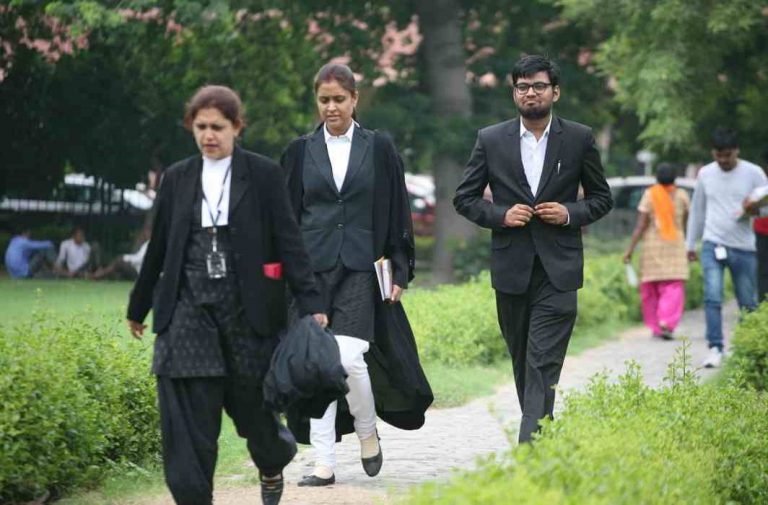
The Supreme Court has asked the centre to bring in a law to cap lawyers’ fees. While that is pending, a look into why they are paid so much in the first place

~By Ranjeev C Dubey
“Can’t you see,” Pink Floyd’s singer songwriter Roger Waters berated us in 1984, “it all makes perfect sense, expressed in dollars and cents.” This must be why Supreme Court senior counsels aren’t celebrities till they make Rs 10 lakh a hearing! This is easy to understand: if you are that good, why isn’t someone putting their money where your mouth is? In this case, life mimics perception. We have recently appointed several superb lawyers directly to the Supreme Court as judges. They used to cost as much as the best lawyers before their elevation. So why has the Supreme Court expressed concern over the “astronomical fees” charged by lawyers and said that “the commercialization of the legal profession is in violation of the fundamental right of the poor to get equal justice”?
The Supreme Court is right, of course. It has always held its judicial conscience close to the heart of its pronouncements. But do fee caps even begin to address the issue? You can stop lawyers earning money, but can you force them to serve the poor? Then again, isn’t this a case of Freudian Displacement? When girls get molested in cars, we don’t deal with the complex of social, psychological and cultural factors at play. Instead, we ban cars from sporting darkened windows. No doubt, when girls get raped in homes, we will ban domestic walls too. What we need to do is to ask a fundamental question: Why are top lawyers being paid so much?
Ridiculous laws
Snipped off the trimmings, I would say it comes down to the cumulative impact of three reasons. At the root of it all sits a pertinacious legislature dispensing (like Lord Tennyson’s Achilles) “unequal laws to a savage race”. I am not being bitter. The main purpose of many laws is a kind of perverse “wealth re-engineering”. As if that wasn’t bad enough, we have an enviable bouquet of ridiculous laws that the Law Commission can’t see. The internet is awash with such lists but here is a quick sampler. At 18, you are old enough to elect your political representative, but it is another seven years before you are old enough to drink.
On a more serious note, we have in our statute books a plethora of laws that criminalise a CEO of a company because the drinking water supply isn’t up to scratch or the walls of the worker’s canteen are not smooth enough or women worked there at night (try the Factories Act 1948).
The Industrial Disputes Act 1947 is a whole lot worse. Not only can’t you start an industry without a dozen approvals and permits, you can’t fire any but the last employee to be hired, modernise a plant without a 21-day “Change of Conditions of Service” notice or shut down the place without a babu’s approval. Here’s the bottomline: when you make impractical laws that fly in the face of the times in which we live, you are going to end up with people who can neither follow the law nor run a business that makes commercial sense. Courts then become the magic wands that cure political diseases.
Bureaucracy’s role
That brings up Reason No. 2. Our fabled “functioning anarchy” has allowed the political classes to use the government to further their own acquisitive agendas. India’s democracy is now a vast criminal enterprise where political groups combine to capture power so that they can strip the nation and convert public resources into private wealth. As all governance yields political funding, administrators can’t take any decision at all without permission from the political classes. Government jobs are now sold, with the result that an entire class of civil servants is looking for ways to recover their entry investment into bureaucracy. This is not a polity where you expect to be treated fairly. To get justice, you have to go to court.
When you put these two factors together, you get a system of administration which funnels disputes at very high volumes into the justice machine, clogging it, resulting in an irremediable logjam. That is our problem number 3. It has become so absurd now that the government is a litigant in 65 percent of all civil cases, sometimes on both sides of the dispute. As former Chief Justice HL Dattu so candidly acknowledged in 2015, India has more than three crore pending cases. One estimate claims that at current disposal rates, we will need 466 years to clear the backlog. This is easy to believe because with 15 judges per million, we have one-seventh as many judges as the US (100 judges per million) in a society that is at least seven times as dysfunctional. In a world where 30 million cases are up for decision, what makes a plaintiff’s cry of anguish so evocatively heartrending and why should the court care to give you priority time? Some cases will never be decided, or so it seems.
In this crazy state of dysfunction, what can you possible achieve by going to court with your grievance? The truth is that most people wouldn’t go to court if they can possibly avoid it: those that do, have no choice. Those who understand how the racket works simply “take the law in their own hands”. When the warring parties do get to court, the whole game is about getting interim orders because the actual case isn’t decided for decades. In this world of paralysed time and frozen turbulence, let us redefine our expectation from a lawyer. You want the guy to move the system that you know moves very little. You also want to use the system to fight a predatory state that has legislated perfectly “legal” but immoral laws designed to unfairly victimise you. You are probably going to court asking them not to apply a bad law. You can take it that all things considered, the court would not be super-enthused about doing that for you.
Lawyer’s role
In this environment, when the justice machine is being relentlessly ground into the dust till it risks being reduced to a wasteland, if you can actually get a lawyer to deliver you any kind of justice in terms of interim arrangements, what will you not pay him for the privilege of representing you?
The larger issue is what you can possibly do about it. You could argue it’s not too big to fix. You can take each element of the three problems described above and start addressing them one at a time. But till those big ticket problems get fixed, what is the immediate short-term strategy the courts can adopt?
To me, it’s very simple. If courts treat all lawyers as equal in all respects, there is no reason for anyone to pay more for one than the other. Are all lawyers actually equal? Of course not! But more than that, brilliant lawyers can hash up an argument in court but still get better orders than average lawyers arguing a case exactly right. The difference is in brand image and equity. Perception is reality, and that is the incentive that drives high professional fees.
If the Supreme Court wants to reduce lawyer’s fees, it has to change the incentives of the environment. This requires the judges to meticulously read the files supported by teams of chamber juniors and then render sagacious judgments without relying on much help from senior lawyers. Instead, merely capping fees won’t change the behavior; it will merely drive the business underground.
—The author is Managing Partner of the corporate law firm N South. His bestselling expose of the real world of Indian courts Legal Confidential was released in November 2015

